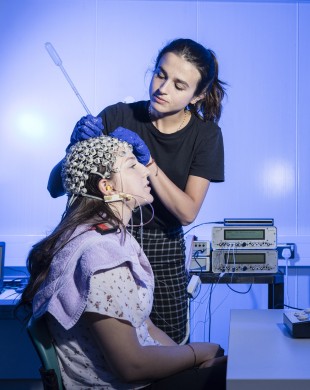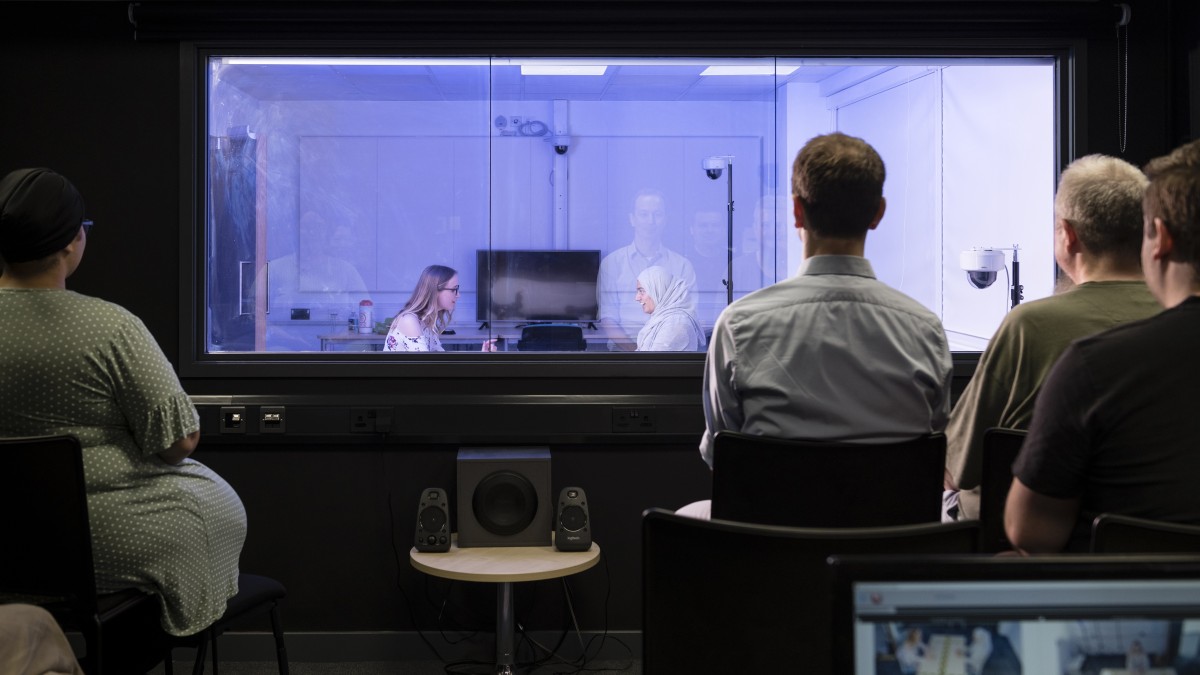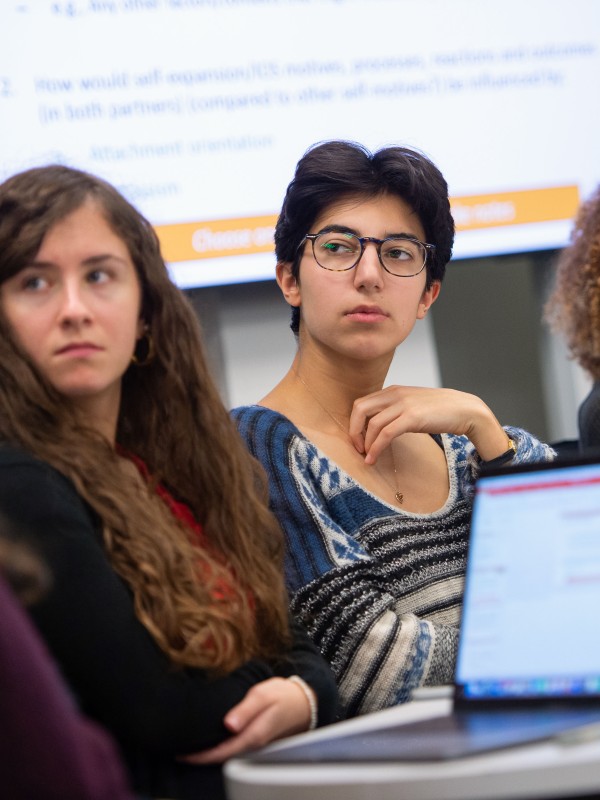
- Social Psychology
MSc — 2025 entry Social Psychology
On this MSc, you'll study the science of how we think, feel and behave in social contexts and immerse yourself in theories, methods and evidence-based research within social psychology.
Why choose
this course?
- Learn from lecturers who are active researchers in individual differences, emotions, prejudice and discrimination, social communication and much more.
- Access our state-of-the-art psychology facilities, including a six-room virtual reality suite and two observation laboratories, to delve into the science of how we think about ourselves and other people, and how we influence and relate to one another.
- Join our Social Emotions and Equality in Relations Research Group to take part in seminars and workshops, and benefit from our links with renowned research institutions across the world.
Statistics
100%
Of our psychology masters graduates are in employment or further study (Graduate Outcomes 2024, HESA)
9th in the UK
The University of Surrey is ranked 9th in the UK for overall student satisfaction (Postgraduate Taught Experience Survey 2023)
12th in the UK
Surrey is ranked 12th in the UK in the Complete University Guide 2025
What you will study
You’ll explore topics such as prejudice and discrimination, moral judgement and emotions. You’ll examine how individuals and groups interact to construct and maintain identities, and the links between psychology and social change, communities and relationships.
We’ll provide you with an in-depth understanding of contemporary approaches and the skills required to conduct research in the field, through cutting-edge methods and techniques. We’ll also give you an insight into qualitative and quantitative research methods, including the use of statistical software, ensuring you have a solid foundation to collect, analyse and interpret data.
You’ll complete a research dissertation that will allow you to carry out experiments and projects on important topics in the field, with previous students researching:
- Is the world neutral for non-binary people? Investigating linguistic differences in cisgender and non-binary individuals
- Investigating the sexual double standard in consensual non-monogamy: are women evaluated more harshly?
Research groups
You’ll be invited to join our Social Emotions and Equality in Relations Research Group where our members conduct research for the EU, UK research councils, industry organisations, and charities. Recent projects have included:
- Humour to counteract the effects of sexual objectification
- Investigating the role of essentialism in children’s acceptance of, and attitudes toward, social exclusion
- The world needs hope: a Covid-19 longitudinal study.
You’ll participate in discussions about research topics, findings and publications, and you’ll benefit from our links with renowned research institutions across the world. We also have a host of external speakers that visit us and present their work, and a collection of seminars and workshops, allowing you to network with like-minded individuals.
The structure of our programmes follows clear educational aims that are tailored to each programme. These are all outlined in the programme specifications which include further details such as the learning outcomes:
Modules
Modules listed are indicative, reflecting the information available at the time of publication. Modules are subject to teaching availability, student demand and/or class size caps.
The University operates a credit framework for all taught programmes based on a 15-credit tariff, meaning all modules are comprised of multiples of 15 credits, up to a maximum of 120 credits.
Course options
Year 1
Semester 1
Compulsory
This module provides students with an advanced understanding of current theories and conceptualisations of social change and influence, including facilitators of and constraints on change. It offers a critical engagement with these theories and an application of them to a range of social issues that are a focus of the United Nations Sustainability Development Goals. The applied aspect includes a consideration of the value of psychological conceptualisations of social change and influence for policy making, public health, and equality. This core module will allow students to build knowledge and skills that will prepare students for the rest of the programme and the optional modules
View full module detailsThis level 7 module introduces students to the principles and practices of qualitative research. It provides students with the requisite knowledge and skills to undertake, critically evaluate, and write up a small qualitative research project. Students will be introduced to a range of methods of qualitative data collection and analytic procedures and gain insight into the application of qualitative methods through practical group work. Students will be encouraged to participate actively and think critically about the principles, methods and procedures that we will discuss. In terms of the students’ learning journey, the module will equip them to undertake a qualitative project for their dissertation should they choose to do so. The module is designed to introduce students who have little or no experience of qualitative research to the principles and practices of this approach. It also meets the needs of those who already have some experience in this area, by enabling these students to build on, refine, and extend their existing knowledge through the provision of advanced material on Surrey Learn in the form of captured content relating to additional methods of analysing qualitative data. These students will also be encouraged to extend their practical knowledge and experience by selecting an analytic procedure that they have not previously used to analyse the data for their group project. Through conducting a small group project students will be given the opportunity to gain experience in conducting qualitative research and in applying the principles and practices covered in the lectures. The module provides students with an opportunity to learn about the interpersonal skills required to conduct a good research interview and those needed to successfully conduct and manage a group project. Students are also encouraged to develop their personal reflective skills to enhance their understanding of how their own cultural background, social identity, gender, previous experiences, and prior knowledge can shape data collection and analysis, as well as individual sense-making.
View full module detailsThis module will provide students with knowledge, skills, and practical experience of advanced research methods and design. It emphasises a critical and creative approach to evaluating research methods and design and applying them to scientific questions. It will support the development of novel, theoretically significant, rigorous, and impactful research proposals.
View full module detailsThis module equips students with the skills to design and undertake academic research in psychology, in preparation for developing their own dissertations. The module will cover key aspects of research design, including literature review, forming hypotheses, ethical conduct, and study design and methods, both quantitative and qualitative. Students will propose a study design in a group presentation; implement the study via small-scale data collection and analysis; and present and discuss the findings in an individual research report.
View full module detailsOptional
This module will offer an advanced overview of topics connected with the social psychology of language and communication. Students will learn how key phenomena of social psychology such as stereotyping, discrimination, interpersonal and intergroup relations are formed, maintained, transmitted, and changed through communication and language means. Specifically, the module will focus on social issues that are the focus of the United Nations Sustainable Development Goals (e.g., gender inequality). In the process of doing so, students will learn the key theoretical and empirical developments of social psychology of language and communication and will get acquainted with different research approaches. Moreover, they will familiarise themselves with the applications of discussed theories and will use them to identify ways in which language and communication can be used to address social issues. Finally, the module will allow students to be critical of scientific evidence as well as of the strengths and weaknesses of applying theoretical knowledge to social issues.
View full module detailsThis module will introduce students to key concepts in public policy development and how psychological theory and evidence can influence policy. Throughout the module students will be encouraged to build on their previous learning and apply their psychological knowledge and research skills to critically evaluate policy approaches to global societal challenges that are a focus of the United Nations Sustainability Development Goals. They will engage in problem-based decision-making to develop interventions for change. By the end of the module students will be equipped with critical understanding of the relevant psychological approaches to addressing public policy issues (e.g. understanding policies from the perspective of risk and behaviour change) and will have developed the knowledge and practical skills to engage in problem-based decision-making. This module will allow students to build knowledge and skills that will prepare them for the rest of the programme and the world of work.
View full module detailsThis module focuses on the interplay between the self people's cognitions, emotions, and motivations relating to themselves' and interpersonal relationships in adulthood. Self-related constructs and processes permeate the way that we think, feel, and behave in social interactions and ongoing relationships. At the same time, our experiences with other people, especially close others, affect the way we feel about ourselves in the short-term and feed into the way we view ourselves in the long-term. There are also notable individual differences in both effects. These reciprocal processes underlie much of everyday social experience and wellbeing, and can help us to understand our own relationships and feelings, as well as inform applications in therapeutic and organisational settings. However, so far, elements of each process have mostly been studied separately. In this module, we will discuss theory and research addressing different ways that the self and relationships are interdependent and attempt to synthesise the literature to achieve a more holistic understanding of the issues.
View full module detailsSemester 2
Compulsory
This course is a lab-based/practical course intended to get students to use the freely available Jamovi software for data analysis and to understand what they are doing when they use it.
View full module detailsOptional
This module builds on the modules covered in Semester 1 (Contemporary Health Psychology and professional practice and Maintaining health throughout the lifespan). A range of chronic conditions are covered, some which are a global challenge and others which are less well known. Students will learn about these conditions and how the different health psychology theories are used to understand the various beliefs and behaviours associated with these conditions and how they may be targeted in interventions for change. This module provides students with advanced knowledge and understanding of the application of theory to practice relating to chronic conditions. This module has been designed in accordance with requirements (Stage 1) of the British Psychological Society's Division of Health Psychology accreditation criteria. This module addresses the following curriculum areas for a British Psychological Society accredited Health Psychology Master's degree: contexts and perspectives in health psychology, physiological and psychosomatic disease processes, client groups and other stakeholders, measurement issues, health-related behavior and cognitions, interventions and healthcare and professional settings. This module builds employability skills by broadening knowledge of chronic conditions and interventions, and will help students to understand how to apply health psychology theory and practice to different chronic conditions and patient populations.
View full module detailsThis module covers psychological factors that influence the patient's passage through the health care system from symptom perception to help seeking to the consultation with a focus on specific aspects of health care such as surgery and vaccinations. This module has been designed in accordance with requirements (stage 1) of the British Psychological Society's Division of Health Psychology accreditation criteria. This module addresses the following curriculum areas for a British Psychological Society accredited Health Psychology Masters degree: contexts and perspectives in health psychology, client groups and other stakeholders, health-related behaviour and cognitions, interventions, measurement issues and healthcare and professional settings. This module will help students to better understand how health psychology theory can help us understand the patient experience of healthcare.
View full module detailsThis module will examine critical perspectives in moral psychology, discussing critical debates about what moral concepts are. Building on previous topics in social psychology, we will discuss and evaluate whether morals are universal or culturally relative; whether morals are based on intuitions/emotions or reasoning, and what makes a moral judgement. We will also discuss what makes moral emotions unique, evaluating four different kinds of moral emotions (other-condemning, self-conscious, other-praising, other-suffering). We will discuss how moral convictions and moral character impact thoughts and behaviours. The module will cover theoretical and empirical findings that explore implications of moral concepts. We will also critically evaluate how different moral concepts should be defined and assessed, based on empirical research, which will result in the development of a literature review and poster.
View full module detailsThis module introduces students to psychological perspectives on understanding and addressing environmental and sustainability challenges. The module provides an overview of theoretical formulations and research evidence related to 1) people’s understandings and perceptions of environmental risks, 2) environmental and materialistic values, 3) environment and wellbeing, and 4) pro-environmental behaviour change. The module is based on the research-practitioner model and aims to enable students to develop an understanding of how psychological research can help tackle environmental challenges by drawing on empirical research evidence. By the end of the module students should have an advanced understanding of some of the principles and theoretical and methodological developments in the area, and understand the value of this knowledge for helping to tackle environmental challenges.
View full module detailsThis dual-level module seeks to both explore theories and models of people's behaviour, and to illustrate these via application to real-world, contemporary issues. Students will be introduced to a range of psychological approaches that can be used to understand and influence behaviour (e.g., motivational approaches, nudging), and to a range of applied behavioural contexts including health (e.g., how can we help people be more active?) and environmental (e.g., how can we help people consume less energy?). Each lecture serves to introduce both one psychological theory or concept, and a specific real-world behavioural challenge, to which that theory (and others) may be applied. Lectures are supplemented by seminars and workshops. Seminars involve unassessed group presentations and critical discussions of research papers relating to the application of psychological strategies to contemporary behaviour change challenges. Workshops centre on group-based, problem-based learning, with students addressing a real-world behaviour change problem.
View full module detailsThis module introduces students to theories, methods, and research findings in the area of social and moral development during childhood and adolescence. We begin by looking at development in the context of important relationships, such as peers and friends, families, and schools. We next examine the development of the self and other categories that make up who we are (e.g., ethnicity). This module relies on socio-cultural and eco-cultural perspectives to try to understand development in context to increase your global and cultural capabilities.
View full module detailsSemester 1 & 2
Core
It is a requirement of the University that taught postgraduate programmes include a dissertation and/or major project module. For this module students will conduct their own piece of empirical research in an area relevant to their Masters course, under supervision of a member of academic staff. For the assessment students will subject either a qualitative or mixed-method research report of 10,000 words or a quantitative research report of 8,000 words (maximum).Overall student workload: 600 hoursThis includes 12 hours of tutor supervision. These hours will include development of theoretical framework, aims and hypotheses, recruiting samples, fieldwork and liaison with key personnel as appropriate, data recording and analysis, interpretation and writing up. Specific times for these subsections cannot be given as they vary from project to project.
View full module detailsOptional modules for Year 1 (full-time) - FHEQ Level 7
For further information regarding programme structure and module selection, please refer to the course catalogue.
Year 1
Semester 1
Compulsory
This module provides students with an advanced understanding of current theories and conceptualisations of social change and influence, including facilitators of and constraints on change. It offers a critical engagement with these theories and an application of them to a range of social issues that are a focus of the United Nations Sustainability Development Goals. The applied aspect includes a consideration of the value of psychological conceptualisations of social change and influence for policy making, public health, and equality. This core module will allow students to build knowledge and skills that will prepare students for the rest of the programme and the optional modules
View full module detailsThis module will provide students with knowledge, skills, and practical experience of advanced research methods and design. It emphasises a critical and creative approach to evaluating research methods and design and applying them to scientific questions. It will support the development of novel, theoretically significant, rigorous, and impactful research proposals.
View full module detailsThis module equips students with the skills to design and undertake academic research in psychology, in preparation for developing their own dissertations. The module will cover key aspects of research design, including literature review, forming hypotheses, ethical conduct, and study design and methods, both quantitative and qualitative. Students will propose a study design in a group presentation; implement the study via small-scale data collection and analysis; and present and discuss the findings in an individual research report.
View full module detailsSemester 2
Compulsory
This course is a lab-based/practical course intended to get students to use the freely available Jamovi software for data analysis and to understand what they are doing when they use it.
View full module detailsOptional
This module builds on the modules covered in Semester 1 (Contemporary Health Psychology and professional practice and Maintaining health throughout the lifespan). A range of chronic conditions are covered, some which are a global challenge and others which are less well known. Students will learn about these conditions and how the different health psychology theories are used to understand the various beliefs and behaviours associated with these conditions and how they may be targeted in interventions for change. This module provides students with advanced knowledge and understanding of the application of theory to practice relating to chronic conditions. This module has been designed in accordance with requirements (Stage 1) of the British Psychological Society's Division of Health Psychology accreditation criteria. This module addresses the following curriculum areas for a British Psychological Society accredited Health Psychology Master's degree: contexts and perspectives in health psychology, physiological and psychosomatic disease processes, client groups and other stakeholders, measurement issues, health-related behavior and cognitions, interventions and healthcare and professional settings. This module builds employability skills by broadening knowledge of chronic conditions and interventions, and will help students to understand how to apply health psychology theory and practice to different chronic conditions and patient populations.
View full module detailsThis module covers psychological factors that influence the patient's passage through the health care system from symptom perception to help seeking to the consultation with a focus on specific aspects of health care such as surgery and vaccinations. This module has been designed in accordance with requirements (stage 1) of the British Psychological Society's Division of Health Psychology accreditation criteria. This module addresses the following curriculum areas for a British Psychological Society accredited Health Psychology Masters degree: contexts and perspectives in health psychology, client groups and other stakeholders, health-related behaviour and cognitions, interventions, measurement issues and healthcare and professional settings. This module will help students to better understand how health psychology theory can help us understand the patient experience of healthcare.
View full module detailsThis module will examine critical perspectives in moral psychology, discussing critical debates about what moral concepts are. Building on previous topics in social psychology, we will discuss and evaluate whether morals are universal or culturally relative; whether morals are based on intuitions/emotions or reasoning, and what makes a moral judgement. We will also discuss what makes moral emotions unique, evaluating four different kinds of moral emotions (other-condemning, self-conscious, other-praising, other-suffering). We will discuss how moral convictions and moral character impact thoughts and behaviours. The module will cover theoretical and empirical findings that explore implications of moral concepts. We will also critically evaluate how different moral concepts should be defined and assessed, based on empirical research, which will result in the development of a literature review and poster.
View full module detailsThis module introduces students to psychological perspectives on understanding and addressing environmental and sustainability challenges. The module provides an overview of theoretical formulations and research evidence related to 1) people’s understandings and perceptions of environmental risks, 2) environmental and materialistic values, 3) environment and wellbeing, and 4) pro-environmental behaviour change. The module is based on the research-practitioner model and aims to enable students to develop an understanding of how psychological research can help tackle environmental challenges by drawing on empirical research evidence. By the end of the module students should have an advanced understanding of some of the principles and theoretical and methodological developments in the area, and understand the value of this knowledge for helping to tackle environmental challenges.
View full module detailsThis dual-level module seeks to both explore theories and models of people's behaviour, and to illustrate these via application to real-world, contemporary issues. Students will be introduced to a range of psychological approaches that can be used to understand and influence behaviour (e.g., motivational approaches, nudging), and to a range of applied behavioural contexts including health (e.g., how can we help people be more active?) and environmental (e.g., how can we help people consume less energy?). Each lecture serves to introduce both one psychological theory or concept, and a specific real-world behavioural challenge, to which that theory (and others) may be applied. Lectures are supplemented by seminars and workshops. Seminars involve unassessed group presentations and critical discussions of research papers relating to the application of psychological strategies to contemporary behaviour change challenges. Workshops centre on group-based, problem-based learning, with students addressing a real-world behaviour change problem.
View full module detailsThis module introduces students to theories, methods, and research findings in the area of social and moral development during childhood and adolescence. We begin by looking at development in the context of important relationships, such as peers and friends, families, and schools. We next examine the development of the self and other categories that make up who we are (e.g., ethnicity). This module relies on socio-cultural and eco-cultural perspectives to try to understand development in context to increase your global and cultural capabilities.
View full module detailsOptional modules for Year 1 (part-time) - FHEQ Level 7
For further information regarding programme structure and module selection, please refer to the course catalogue.
Year 2
Semester 1
Compulsory
This level 7 module introduces students to the principles and practices of qualitative research. It provides students with the requisite knowledge and skills to undertake, critically evaluate, and write up a small qualitative research project. Students will be introduced to a range of methods of qualitative data collection and analytic procedures and gain insight into the application of qualitative methods through practical group work. Students will be encouraged to participate actively and think critically about the principles, methods and procedures that we will discuss. In terms of the students’ learning journey, the module will equip them to undertake a qualitative project for their dissertation should they choose to do so. The module is designed to introduce students who have little or no experience of qualitative research to the principles and practices of this approach. It also meets the needs of those who already have some experience in this area, by enabling these students to build on, refine, and extend their existing knowledge through the provision of advanced material on Surrey Learn in the form of captured content relating to additional methods of analysing qualitative data. These students will also be encouraged to extend their practical knowledge and experience by selecting an analytic procedure that they have not previously used to analyse the data for their group project. Through conducting a small group project students will be given the opportunity to gain experience in conducting qualitative research and in applying the principles and practices covered in the lectures. The module provides students with an opportunity to learn about the interpersonal skills required to conduct a good research interview and those needed to successfully conduct and manage a group project. Students are also encouraged to develop their personal reflective skills to enhance their understanding of how their own cultural background, social identity, gender, previous experiences, and prior knowledge can shape data collection and analysis, as well as individual sense-making.
View full module detailsOptional
This module will offer an advanced overview of topics connected with the social psychology of language and communication. Students will learn how key phenomena of social psychology such as stereotyping, discrimination, interpersonal and intergroup relations are formed, maintained, transmitted, and changed through communication and language means. Specifically, the module will focus on social issues that are the focus of the United Nations Sustainable Development Goals (e.g., gender inequality). In the process of doing so, students will learn the key theoretical and empirical developments of social psychology of language and communication and will get acquainted with different research approaches. Moreover, they will familiarise themselves with the applications of discussed theories and will use them to identify ways in which language and communication can be used to address social issues. Finally, the module will allow students to be critical of scientific evidence as well as of the strengths and weaknesses of applying theoretical knowledge to social issues.
View full module detailsThis module will introduce students to key concepts in public policy development and how psychological theory and evidence can influence policy. Throughout the module students will be encouraged to build on their previous learning and apply their psychological knowledge and research skills to critically evaluate policy approaches to global societal challenges that are a focus of the United Nations Sustainability Development Goals. They will engage in problem-based decision-making to develop interventions for change. By the end of the module students will be equipped with critical understanding of the relevant psychological approaches to addressing public policy issues (e.g. understanding policies from the perspective of risk and behaviour change) and will have developed the knowledge and practical skills to engage in problem-based decision-making. This module will allow students to build knowledge and skills that will prepare them for the rest of the programme and the world of work.
View full module detailsThis module focuses on the interplay between the self people's cognitions, emotions, and motivations relating to themselves' and interpersonal relationships in adulthood. Self-related constructs and processes permeate the way that we think, feel, and behave in social interactions and ongoing relationships. At the same time, our experiences with other people, especially close others, affect the way we feel about ourselves in the short-term and feed into the way we view ourselves in the long-term. There are also notable individual differences in both effects. These reciprocal processes underlie much of everyday social experience and wellbeing, and can help us to understand our own relationships and feelings, as well as inform applications in therapeutic and organisational settings. However, so far, elements of each process have mostly been studied separately. In this module, we will discuss theory and research addressing different ways that the self and relationships are interdependent and attempt to synthesise the literature to achieve a more holistic understanding of the issues.
View full module detailsSemester 2
Optional
This module builds on the modules covered in Semester 1 (Contemporary Health Psychology and professional practice and Maintaining health throughout the lifespan). A range of chronic conditions are covered, some which are a global challenge and others which are less well known. Students will learn about these conditions and how the different health psychology theories are used to understand the various beliefs and behaviours associated with these conditions and how they may be targeted in interventions for change. This module provides students with advanced knowledge and understanding of the application of theory to practice relating to chronic conditions. This module has been designed in accordance with requirements (Stage 1) of the British Psychological Society's Division of Health Psychology accreditation criteria. This module addresses the following curriculum areas for a British Psychological Society accredited Health Psychology Master's degree: contexts and perspectives in health psychology, physiological and psychosomatic disease processes, client groups and other stakeholders, measurement issues, health-related behavior and cognitions, interventions and healthcare and professional settings. This module builds employability skills by broadening knowledge of chronic conditions and interventions, and will help students to understand how to apply health psychology theory and practice to different chronic conditions and patient populations.
View full module detailsThis module covers psychological factors that influence the patient's passage through the health care system from symptom perception to help seeking to the consultation with a focus on specific aspects of health care such as surgery and vaccinations. This module has been designed in accordance with requirements (stage 1) of the British Psychological Society's Division of Health Psychology accreditation criteria. This module addresses the following curriculum areas for a British Psychological Society accredited Health Psychology Masters degree: contexts and perspectives in health psychology, client groups and other stakeholders, health-related behaviour and cognitions, interventions, measurement issues and healthcare and professional settings. This module will help students to better understand how health psychology theory can help us understand the patient experience of healthcare.
View full module detailsThis module will examine critical perspectives in moral psychology, discussing critical debates about what moral concepts are. Building on previous topics in social psychology, we will discuss and evaluate whether morals are universal or culturally relative; whether morals are based on intuitions/emotions or reasoning, and what makes a moral judgement. We will also discuss what makes moral emotions unique, evaluating four different kinds of moral emotions (other-condemning, self-conscious, other-praising, other-suffering). We will discuss how moral convictions and moral character impact thoughts and behaviours. The module will cover theoretical and empirical findings that explore implications of moral concepts. We will also critically evaluate how different moral concepts should be defined and assessed, based on empirical research, which will result in the development of a literature review and poster.
View full module detailsThis module introduces students to psychological perspectives on understanding and addressing environmental and sustainability challenges. The module provides an overview of theoretical formulations and research evidence related to 1) people’s understandings and perceptions of environmental risks, 2) environmental and materialistic values, 3) environment and wellbeing, and 4) pro-environmental behaviour change. The module is based on the research-practitioner model and aims to enable students to develop an understanding of how psychological research can help tackle environmental challenges by drawing on empirical research evidence. By the end of the module students should have an advanced understanding of some of the principles and theoretical and methodological developments in the area, and understand the value of this knowledge for helping to tackle environmental challenges.
View full module detailsThis dual-level module seeks to both explore theories and models of people's behaviour, and to illustrate these via application to real-world, contemporary issues. Students will be introduced to a range of psychological approaches that can be used to understand and influence behaviour (e.g., motivational approaches, nudging), and to a range of applied behavioural contexts including health (e.g., how can we help people be more active?) and environmental (e.g., how can we help people consume less energy?). Each lecture serves to introduce both one psychological theory or concept, and a specific real-world behavioural challenge, to which that theory (and others) may be applied. Lectures are supplemented by seminars and workshops. Seminars involve unassessed group presentations and critical discussions of research papers relating to the application of psychological strategies to contemporary behaviour change challenges. Workshops centre on group-based, problem-based learning, with students addressing a real-world behaviour change problem.
View full module detailsThis module introduces students to theories, methods, and research findings in the area of social and moral development during childhood and adolescence. We begin by looking at development in the context of important relationships, such as peers and friends, families, and schools. We next examine the development of the self and other categories that make up who we are (e.g., ethnicity). This module relies on socio-cultural and eco-cultural perspectives to try to understand development in context to increase your global and cultural capabilities.
View full module detailsSemester 1 & 2
Core
It is a requirement of the University that taught postgraduate programmes include a dissertation and/or major project module. For this module students will conduct their own piece of empirical research in an area relevant to their Masters course, under supervision of a member of academic staff. For the assessment students will subject either a qualitative or mixed-method research report of 10,000 words or a quantitative research report of 8,000 words (maximum).Overall student workload: 600 hoursThis includes 12 hours of tutor supervision. These hours will include development of theoretical framework, aims and hypotheses, recruiting samples, fieldwork and liaison with key personnel as appropriate, data recording and analysis, interpretation and writing up. Specific times for these subsections cannot be given as they vary from project to project.
View full module detailsOptional modules for Year 2 (part-time) - FHEQ Level 7
Part-time students split the modules across two years and they are required to complete two modules (either compulsory or optional) per semester
Teaching and learning
Your teaching will be delivered through a combination of:
- Group work (e.g., discussion groups)
- Lectures
- Online learning
- Seminars
- Workshops.
Outside of these, you’ll be expected to carry out independent study, including coursework, essays and reading.
Teaching staff
You’ll be taught by lecturers who are active researchers, ensuring everything you learn is up-to-date and relevant to employers. These may include:
General course information
Contact hours
Contact hours can vary across our modules. Full details of the contact hours for each module are available from the University of Surrey's module catalogue. See the modules section for more information.
Timetable
Course timetables are normally available one month before the start of the semester.
New students will receive their personalised timetable in Welcome Week, and in subsequent semesters, two weeks prior to the start of semester.
Please note that while we make every effort to ensure that timetables are as student-friendly as possible, scheduled teaching can take place on any day of the week (Monday – Friday). Wednesday afternoons are normally reserved for sports and cultural activities. Part-time classes are normally scheduled on one or two days per week, details of which can be obtained from Academic Administration.
Location
This course is based at Stag Hill campus. Stag Hill is the University's main campus and where the majority of our courses are taught.
We offer careers information, advice and guidance to all students whilst studying with us, which is extended to our alumni for three years after leaving the University.
We’ll provide you with valuable analytical, experimental and research skills that are in high demand in a wide range of careers. 100 per cent of our postgraduate psychology graduates go on to employment or further study (Graduate Outcomes 2024, HESA).
Our alumni take on roles as consultants, market researchers, social researchers and support workers. They work for governments, charities, think-tanks and pressure groups, with previous graduates employed by the Defence Science and Technology Laboratory and the Office for National Statistics.
The broad and transferrable skills that you’ll develop are also highly relevant in other fields, including analysis, design, development and healthcare. Many of our graduates go on to complete a PhD, investigating an area of personal interest.
Learn more about psychology careers on the BPS website.
Our psychology facilities will give you access to the latest equipment, including a virtual reality suite to simulate real-life scenarios and two observation labs. You'll be able to monitor eye tracking and physiological measures such as earlobe temperature, heart rate and galvanic skin response, both in the lab and remotely, using mobile data loggers.
You’ll also have access to an extensive library of psychometric and clinical tests, 20 bookable project rooms, a breakout space, equipment lockers and a computer lab.




Shazliya Zuhri
Student - Social Psychology MSc
"The professors and researchers at the University are exceptional in their respective fields and are always willing to go the extra mile to ensure that students are able to achieve their academic goals."


Olivia Crawford
Student - Social Psychology MSc
"The lecturers and academic staff are always so supportive of students and are willing to help you in any way they can."
UK qualifications
A minimum of a 2:2 UK honours degree in psychology, or a recognised international equivalent.
We may be able to take relevant work experience into consideration if you don't meet these requirements. If you have at least one year of relevant experience in a full-time graduate-level role (or a minimum of two years’ experience in a relevant graduate-level part-time role) please provide full details of your role and responsibilities in your personal statement and CV when you submit your application.
English language requirements
IELTS Academic: 7.0 overall with 6.5 in each element.
These are the English language qualifications and levels that we can accept.
If you do not currently meet the level required for your programme, we offer intensive pre-sessional English language courses, designed to take you to the level of English ability and skill required for your studies here.


International Pre-Masters
Prepare for postgraduate study and boost your career prospects. This is an intensive programme of academic subjects, study skills and English language preparation designed to help you succeed.
Selection process
Selection will be based upon the candidate’s application and references. Applications that do not meet the standard criteria are referred to the admissions tutor.
Recognition of prior learning
We recognise that many students enter their course with valuable knowledge and skills developed through a range of ways.
If this applies to you, the recognition of prior learning process may mean you can join a course without the formal entry requirements, or at a point appropriate to your previous learning and experience.
There are restrictions for some courses and fees may be payable for certain claims. Please contact the Admissions team with any queries.
Study and work abroad
There may be opportunities to acquire valuable European experience by working or conducting research abroad during your degree or shortly afterwards.
Scholarships and bursaries
Discover what scholarships and bursaries are available to support your studies.
Fees per year
Explore UKCISA’s website for more information if you are unsure whether you are a UK or overseas student. View the list of fees for all postgraduate courses.
September 2025 - Full-time - 1 year
- UK
- £10,900
- Overseas
- £24,900
September 2025 - Part-time - 2 years
- UK
- £5,500
- Overseas
- £12,500
- If you are on the two-year part-time masters programme, the annual fee is payable in Year 1 and Year 2 of the programme
- These fees apply to students commencing study in the academic year 2025-26 only. Fees for new starters are reviewed annually.
Payment schedule
- Students with Tuition Fee Loan: the Student Loans Company pay fees in line with their schedule (students on an unstructured self-paced part-time course are not eligible for a Tuition Fee Loan).
- Students without a Tuition Fee Loan: pay their fees either in full at the beginning of the programme or in two instalments as follows:
- 50% payable 10 days after the invoice date (expected to be October/November of each academic year)
- 50% in January of the same academic year.
- Students on part-time programmes where fees are paid on a modular basis: cannot pay fees by instalment.
- Sponsored students: must provide us with valid sponsorship information that covers the period of study.
The exact date(s) will be on invoices.
Additional costs
- General programme related costs such as study materials
- Potential costs involved in conducting independent learning remotely e.g. internet connection etc.
Funding
You may be able to borrow money to help pay your tuition fees and support you with your living costs. Find out more about postgraduate student finance.
Apply online
To apply online first select the course you'd like to apply for then log in.
Select your course
Choose the course option you wish to apply for.
Sign in
Create an account and sign into our application portal.
Please note that we may have to close applications before the stated deadline if we receive a high volume of suitable applications. We advise you to submit your application as soon as it is ready.
ApplyPlease note that we may have to close applications before the stated deadline if we receive a high volume of suitable applications. We advise you to submit your application as soon as it is ready.
ApplyAdmissions information
Once you apply, you can expect to hear back from us within 14 days. This might be with a decision on your application or with a request for further information.
Our code of practice for postgraduate admissions policy explains how the Admissions team considers applications and admits students. Read our postgraduate applicant guidance for more information on applying.
About the University of Surrey
Need more information?
Contact our Admissions team or talk to a current University of Surrey student online.
Terms and conditions
When you accept an offer to study at the University of Surrey, you are agreeing to follow our policies and procedures, student regulations, and terms and conditions.
We provide these terms and conditions in two stages:
- First when we make an offer.
- Second when students accept their offer and register to study with us (registration terms and conditions will vary depending on your course and academic year).
View our generic registration terms and conditions (PDF) for the 2024/25 academic year, as a guide on what to expect.
Disclaimer
This online prospectus has been published in advance of the academic year to which it applies.
Whilst we have done everything possible to ensure this information is accurate, some changes may happen between publishing and the start of the course.
It is important to check this website for any updates before you apply for a course with us. Read our full disclaimer.









